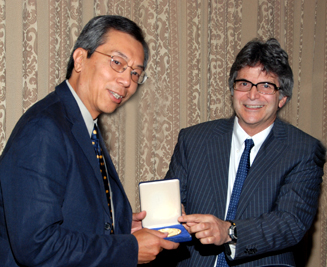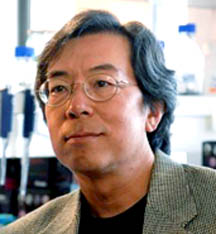 |
|
|

The medal was presented to Dr. Robert Tjian (left) by
Dr. Joseph Rudnick, Dean of Physical Sciences.
|
On Saturday, November 13, 2010
the UCLA Department of Chemistry and Biochemistry
awarded the The 2010 Glenn T. Seaborg Medal
to
Robert Tjian, Ph.D.
President, Howard Hughes Medical Institute
Professor, Department of Molecular and Cell Biology,
University of California, Berkeley
|
|
The 2010 Glenn T. Seaborg Medal was presented to Robert Tjian, Ph.D., President, Howard Hughes Medical Institute and Professor, Department of Molecular and Cell Biology, University of California, Berkeley. The symposium and medal dinner were held on November 13, 2010. The theme of the symposium was "Transcription, Stem Cells, and Differentiation". In addition to Professor Tjian, speakers included Professors Kathrin Plath (UCLA Department of Biological Chemistry), Konrad Hochedlinger (Harvard Stem Cell Institute & Howard Hughes Medical Institute), and Steven L. McKnight (University of Texas, Southwestern Medical Center). |
|
Robert Tjian Biography |
 |
|
Robert Tjian has made major contributions to the understanding of how genes work during three decades on the faculty of the University of California, Berkeley. He has been a Howard Hughes Medical Institute (HHMI) investigator since 1987, and was appointed president of the institute in 2009. HHMI is the second wealthiest philanthropic organization in the United States and the second best endowed medical research foundation in the world. As the President of HHMI, Tjian oversees its $14 billion endowment, the income from which provides support for approximately 350 HHMI investigators, including 13 Nobel Laureates and 141 members of the National Academy of Sciences, at universities across the nation.
In his own laboratory, Tjian researches the biochemical steps that control how genes are turned on and off, steps that are key to the process of decoding the human genome. He discovered proteins called transcription factors that bind to specific sites in DNA and play a critical role in controlling how genetic information is transcribed and translated into the thousands of biomolecules that control the growth and development of cells, tissues, and organisms. Tjian's laboratory has illuminated the relationship between disruptions in the process of transcription and human diseases such as cancer, diabetes, and Huntington's disease. More recently, he has begun studying how transcription factors control the differentiation of embryonic stem cells into muscle, liver, and neurons. His most recent interest is in the development of new approaches to image biochemical activities in living cells.
Tjian was born in Hong Kong, the youngest of nine children. His family fled China before the Communist Revolution and eventually settled in New Jersey. Known as a voracious consumer of scientific information and data, Tjian famously talked his way into the biochemistry laboratory of the late Daniel Koshland (the 2000 Seaborg medalist) as a Berkeley undergraduate—even though he had not yet taken a single biochemistry course.
Tjian went on to receive a bachelor's degree in biochemistry from Berkeley in 1971 and a Ph.D. from Harvard University in 1976. After completing a postdoctoral fellowship at the Cold Spring Harbor Laboratory with James Watson, he joined the Berkeley faculty in 1979. At Berkeley, Tjian assumed a variety of leadership roles, including spearheading a major campus initiative to support and implement new paradigms for bioscience teaching and research. He is a member of the National Academy of Sciences and has received many awards honoring his scientific contributions, including the Alfred P. Sloan Prize from the General Motors Cancer Research Foundation and the Louisa Gross Horwitz Prize from Columbia University. He was named California Scientist of the Year in 1994.
Tjian and his wife Claudia, an attorney, have two daughters, Alexis (a 1997 UCLA graduate) and Lindsey.
|
 |
| |
|
Robert Tjian, Cold Spring Harbor Laboratory, 1978
|
|
|
|
|
|
Welcome & Session Chair I:
Professor Albert Courey
Chair, UCLA Department of Chemistry and Biochemistry |
 |
Professor Kathrin Plath
UCLA Department of Biological Chemistry
"Molecular Events in Reprogramming to Induced Pluripotency" |
 |
Professor Konrad Hochedlinger
Principal Faculty Member, Harvard Stem Cell Institute and Early Career Scientist,
Howard Hughes Medical Institute
"Mechanisms of Cellular Reprogramming" |
 |
Session II Chair:
Professor Stephen Smale
UCLA Department of Microbiology, Immunology, and Molecular Genetics |
 |
Professor Steven L. McKnight
University of Texas, Southwestern Medical Center, Distinquished Chair in Basic Biomedical Research,
Sam G. Winstead and F. Andrew Bell Distinquished Chair in Biochemistry
"Discovery of a Pro-Neurogenic, Neuroprotective Chemical" |
|
Professor Robert Tjian
President, Howard Hughes Medical Institute, Professor, Department of Molecular and Cell Biology,
University of California, Berkeley
"Unexpected Mechanisms of Transcriptional Control Driving
ES Cell Pluripotency and Differentiation" |
|
|
|
| Questions? E-mail seaborg@chem.ucla.edu or call (310) 206-4956 |
|
|
Information webpage from 2010
Updated
08/11/2011
Webmaster - Penny Jennings, penny@chem.ucla.edu
|
